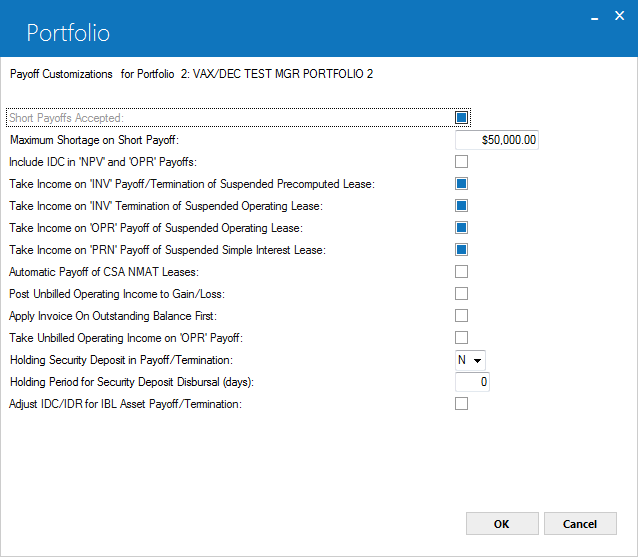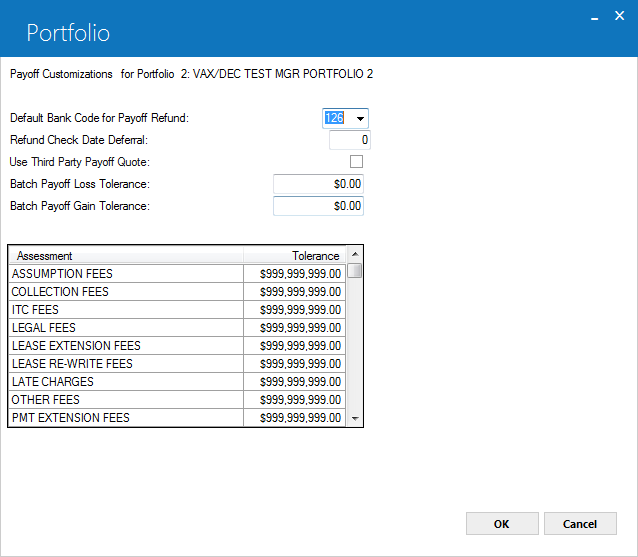U0212 Portfolio
Payoff Customizations
Short Payoff, Take Income Settings

This screen is used to establish or change parameters associated with the Payoff update [U0103] and the optional End-of-Period module, Auto Charge Off [U0440].
- SHORT
PAYOFFS ACCEPTED (Y/N)
Enter Y if payoffs less than the required amount should be accepted by the Payoff update [U0103].
- MAXIMUM SHORTAGE ON SHORT
PAYOFF
If short payoffs are accepted, type the maximum shortage amount that may be processed. If short payoffs are not accepted, this field should be left blank ($0). If there is no maximum, type the amount $99999999999.
- INCLUDE
IDC IN 'NPV' AND 'OPR' PAYOFFS (Y/N)
Enter Y to explicitly include unamortized IDC in the base payoff calculation for the NPV and OPR payoff methods. Currently it is explicitly included in the INV and OPR methods without choice. Enter N to exclude unamortized IDC, which will result in a lower base payoff. The default is N.
- TAKE INCOME ON 'INV' PAYOFF/TERMINATION
OF SUSPENDED PRECOMPUTED LEASES (Y/N)
Enter Y to process any suspended income accrued on a precomputed lease as lessor income at the time of the payoff or termination. Enter N to reverse back any suspended income accrued and suspended IDC into their respective unearned income and unamortized IDC general ledger accounts and then do the payoff or termination.
Both Y and N values will include any suspended unpaid invoices in both payoff and termination quotes and both payoff and termination processing. This will prevent recognition of any income earned after the lease was placed on suspension. See the Calculations document, INV payoff/termination method, for more information on the impact of this switch.
- TAKE INCOME ON 'INV' TERMINATION
OF SUSPENDED OPERATING LEASE (Y/N)
Enter Y to process any suspended income accrued as operating lease income at the time of termination using a termination method of INV. This setting will include any suspended unpaid invoices in a termination or termination quote using an INV termination method. Including any suspended unpaid invoices is only possible if the Take Unbilled Operating Income on OPR Payoff Y/N field in U0212 Portfolio Payoff Customization is set to N. Any suspended unpaid invoices not collected will be recorded as a loss.
Enter N to not allow any suspended income accrued to be reclassified to operating lease income at the time of termination using a termination method of INV. Any suspended unpaid invoices will not be included in a termination or termination quote. No loss will be recorded from any unpaid suspended invoices when the lease is terminated.The base payoff/termination will decrease by the Suspended Income Accrued amount; and Use Tax Payable will reduce accordingly, if applicable.
- TAKE INCOME ON 'OPR' PAYOFF OF SUSPENDED OPERATING LEASE (Y/N)
Enter Y to process any suspended income accrued as operating lease income at the time of payoff using a payoff method of OPR. This setting will include any suspended unpaid invoices in a payoff or payoff quote using an OPR payoff method. Including any suspended unpaid invoices is only possible if the Take Unbilled Operating Income on 'OPR' Payoff (Y/N) field in U0212 Portfolio Payoff Customization is set to N. Any suspended unpaid invoices not collected will be recorded as a loss.
Enter N to not allow any suspended income accrued to be reclassified to operating lease income at the time of payoff using a payoff method of OPR. Any suspended unpaid invoices will not be included in a payoff or payoff quote. No loss will be recorded from any unpaid suspended invoices when the lease is paid off.The base payoff/termination will decrease by the Suspended Income Accrued amount; and Use Tax Payable will reduce accordingly, if applicable.
- TAKE INCOME ON 'PRN' PAYOFF OF SUSPENDED SIMPLE INTEREST LEASE (Y/N)
Enter Y to take income on PRN payoffs of suspended simple interest leases. This switch determines if suspended income will or will not be taken for simple interest leases using the 'PRN' payoff method.In order to take suspended income, the effective date of payoff should be after the effective date of suspension.The base payoff/termination will decrease by the Suspended Income Accrued amount; and Use Tax Payable will reduce accordingly, if applicable.
- AUTOMATIC PAYOFF OF CSA NMAT LEASES (Y/N)
Enter Y to automatically change the status of an NMAT, CSA type lease to NPMT when all balances, receivables and assessments to the lease are zero and the final accrued to date has been processed.A new module in End of Period, Paid Off CSA Leases [U0429] will display the leases status change. Selection of this module can be made via the End of Period Customization option in the Portfolio [U0212] update.
- POST UNBILLED OPERATING INCOME
TO GAIN/LOSS (Y/N)
Enter Y to allow LeasePak to post Unbilled Operating Income to the Gain or Loss accounts instead of the Operating Lease Income account. This new option works in conjunction with the Payoff and Termination [U0103] update and is for operating leases with AOSL/ROSL type accrual methods.
- APPLY INVOICE ON OUTSTANDING
BALANCE FIRST (Y/N)
Controls the calculation of the base taxable amount (Taxable Base) when using the Off-Lease Billing module. If the Off-Lease Billing module is not part of your LeasePak license, this switch is ignored.
In cases where Off Lease Billing invoices include past due lease payments, LeasePak, in most cases, has already taxed these amounts, and the payments plus taxes are included in the Base Payoff. You may need to exclude these amounts when calculating the Taxable Base to avoid having LeasePak tax them twice. Calculations for the switch are:
- "Y": if the Off Lease invoice amount is less than or equal to the Base Payoff amount
Taxable Base = Off Lease invoice amount (no past due invoices)
otherwiseTaxable Base = total payoff amount - total outstanding regular invoices amount
- "N":
Taxable Base = Off Lease invoice amount - total outstanding regular invoices amount
If Taxable Base is less than 0, Taxable Base is set to 0.
- "Y": if the Off Lease invoice amount is less than or equal to the Base Payoff amount
- TAKE
UNBILLED OPERATING INCOME ON 'OPR' PAYOFF (Y/N)
Enter 'Y' to allow LeasePak to include Unbilled Operating Lease Receivable, Deferred Operating Lease Revenue, Unrecognized Operating Lease Income and Suspended Income Accrued in the base Payoff Amount in Payoff [U0103] and Payoff Quote [U0213] updates (this option is new in release v5.0a).When this switch is set to 'N', LeasePak will process OPR type Payoffs as in previous versions, Unbilled Operating Lease Receivable, Deferred Operating Lease Revenue, Unrecognized Operating Lease Income and Suspended Income Accrued, closed with a zero balance upon Payoff.
Refer to the Calculations document for more information on payoff methods.
If this field is set to Y and the Post Unbilled Operating Income to Gain/Loss (Y/N) switch is set to Y, LeasePak will display the following error message: "Post Unbilled Operating Income must be turned off."
-
HOLDING SECURITY DEPOSIT IN PAYOFF/TERM (P/T/B/N)
Cash Control module only: select whether or not to place the security deposit (if any) in suspense instead of including it in the total amount received for the payoff or termination. Type 'P' to place the security deposit in suspense for payoffs only, type 'T' to do this for terminations only, type 'B' to do this for both payoffs and terminations, or type 'N' to include the security deposit in the total amount received (default LeasePak behavior). Default value for this field is 'N'. Refer to one of the following documents for more information:- Payments [U0102]: Batch Number Payment Reversal
- Payoff [U0103]: Payoff, Payoff Reversal
- Payoff [U0103]: Termination, Termination Reversal
- Security Deposit Disbursal [U0408], part of End of Period [U04]: Daily Updates
-
HOLDING PERIOD FOR SECURITY DEPOSIT DISBURSAL (DAYS)
Cash Control module only: if HOLDING SECURITY DEPOSIT IN PAYOFF/TERM is set to 'P', 'T', or 'B', specify the number of days to keep the security deposit (if any) in suspense before disbursing any unused portion through Cashier's Check Disbursal [U0117] during End of Period. The default value for the field is 0; the maximum value is 9999. The value must be less than the value set in NUMBER OF DAYS TO WAIT BEFORE CLEANING UP LEASE RECORDS in the Miscellaneous Customizations for this portfolio.
-
ADJUST IDC/IDR FOR IBL ASSET PAYOFF/TERMINATION (Y/N)
Enter Y to adjust the unamortized IDC/IDR amounts whenever an asset payoff or an asset termination completes for interest bearing loans. This filed defaults to an N.
Tolerance Settings

This screen is used to establish or change parameters associated with the Batch Payoff module and works in conjunction with the Cash Control module, separately purchased modules.
- DEFAULT BANK CODE FOR PAYOFF
REFUND
Enter the default bank code for payoff refunds. If the field is blank an error message will be displayed when creating a Batch Payoff [U0129].
Refund transactions (within portfolio high/low limits) for all credits over the defined amount. As an example, credits under a certain amount would be posted to a gain account while credits equal to or greater would by default result in a refund being created.
- REFUND CHECK DATE DEFERRAL
Enter the deferral date for refund checks.
- USE THIRD PARTY PAYOFF QUOTE
(Y/N)
Enter Y to allow the use of third party payoff quotes.
- BATCH PAYOFF LOSS TOLERANCE
Enter the Batch Payoff loss tolerance amount.
- BATCH PAYOFF GAIN TOLERANCE
Enter the Batch Payoff gain tolerance amount.
Payoffs falling outside of these settings, as well as payoffs that come in on accounts with money in suspense or anti-suspense will be rejected. Suspense items will be created with identifiers to alert the user to the reason for posting failure.
All general ledger entries will be made to maintain the resulting payoff transaction in order to keep the System and G/L in balance.
The interactive Batch Payoff module will permit overrides of these Portfolio settings to occur on a posting of a gain or loss, and the associated G/L accounts. Note that this is true for principal balances; changes in accrued interest should impact interest income while assessments should impact assessment receivable and income/expense accounts.
- ASSESSMENT TOLERANCE (SCROLLED
AREA)
Enter the tolerance amount for the assessment, if any.


